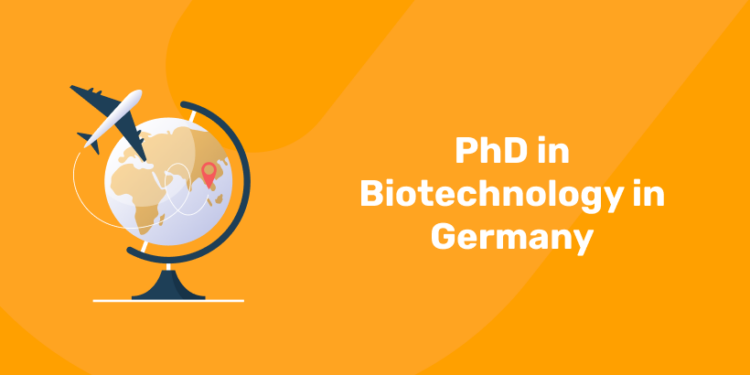Table of Contents
Germany stands as one of the premier destinations for advanced studies in biotechnology, combining rigorous academic frameworks with cutting-edge research opportunities. A PhD in Biotechnology from a German institution opens doors to globally recognized research facilities, extensive networking, and strong industrial partnerships. This blog delves into everything you need to know about pursuing a biotechnology PhD in Germany—covering why Germany is a top choice, leading universities, admissions, scholarships, and career opportunities
PhD in Germany – Significance
Germany is a global leader in biotechnology research, with universities and research institutes consistently pushing boundaries. Pursuing a PhD in Biotechnology here offers various advantages:
- World-Class Research Facilities
German institutions offer advanced research environments, particularly in biotechnology, where students can work with groundbreaking equipment and technologies. Research-driven universities provide ample resources and mentorship under leading experts. - Focus on Practical Experience and Industry Collaboration
Programs in Germany emphasize practical skills, with many universities partnering with biotech firms, giving students access to real-world applications. This approach prepares graduates to enter various industry roles with hands-on expertise. - Availability of Scholarships and Funding
Germany’s commitment to education extends to supporting international students through various scholarships, stipends, and funded positions in research labs. Financial aid opportunities, like DAAD scholarships, help cover tuition and living expenses.
PhD in Germany – Top Universities
1: How do you say "Good Morning" in German?
Germany boasts numerous universities recognized globally for biotechnology research. Here are some of the top institutions to consider:
- Technical University of Munich (TUM)
Known for its strong focus on research and innovation, TUM offers an interdisciplinary approach to biotechnology, covering genetics, molecular biology, and bioinformatics. - University of Heidelberg
Heidelberg is one of the oldest universities in Germany with a well-respected biotech program. Its life sciences department collaborates closely with the Max Planck Institute, enriching PhD research opportunities. - RWTH Aachen University
Offering a collaborative environment, RWTH integrates biotechnology with engineering, making it ideal for those interested in bioengineering and medical biotechnology. - Ludwig Maximilian University of Munich (LMU)
LMU provides state-of-the-art facilities and has several research centers focused on bioinformatics, biochemistry, and microbiology. - University of Göttingen
Known for its excellence in research, the University of Göttingen’s biotechnology program focuses on molecular and cellular biology, with dedicated labs for PhD candidates.
PhD in Germany – Requirements
- Eligibility and Academic Requirements
Most programs require a Master’s degree in biotechnology, biology, or a related field. Some universities may accept applicants with a Bachelor’s degree and significant research experience. - Research Proposal
Students are expected to submit a research proposal that aligns with the faculty’s expertise. A strong proposal, showcasing originality and research viability, increases admission chances. - Language Proficiency
While many programs offer courses in English, knowing German is advantageous, especially when interacting with the industry or applying for scholarships. - Application Deadlines
Deadlines vary, but generally, applications open twice a year. International applicants should prepare well in advance to meet visa and admission timelines. - Costs and Scholarships
Although most public universities in Germany have minimal tuition fees, living costs vary by city. Scholarships like the DAAD and university-specific grants cover fees, living costs, and sometimes travel expenses.
PhD in Germany – Job Prospects
Graduates with a PhD in Biotechnology from Germany are highly sought after across industries, including pharmaceuticals, environmental biotechnology, and academia. Typical roles include:
- Research Scientist
PhD holders in biotechnology are often recruited by top biotech firms and research institutes to lead research projects and develop innovative solutions. - Bioprocess Engineer
Bioprocess engineers work with production processes to ensure the efficient manufacture of biological products. Germany’s industry demand for bioprocess engineers continues to grow. - Clinical Research Scientist
Clinical research is a significant area in Germany, with professionals conducting clinical trials to test new biotechnological and pharmaceutical solutions. - Biotech Consultant
As experts, PhD graduates can also serve as consultants, guiding organizations in areas such as bioinformatics, process optimization, and regulatory compliance. - Academic Positions
With its strong focus on research, Germany offers numerous academic positions where PhD graduates can continue contributing to their field as professors or lab directors.
A Note by Entri
Entri offers specialized courses to build foundational skills in biotechnology and related fields. Many PhD programs offer funding through stipends, grants, or positions in research labs. Additionally, scholarships like the DAAD can cover living expenses. Explore to prepare yourself for a successful PhD journey in Germany.
Master the German Language with Entri App! Click Here for Free Trial Class!
PhD in Germany – Conclusion
Pursuing a PhD in Biotechnology in Germany presents unparalleled opportunities for growth, research, and industry connections. From rigorous academic programs to job opportunities in top biotech firms, a German PhD can pave the way for a rewarding and impactful career. If you’re considering this path, make sure to prepare well for the application process and leverage available scholarships to make the most of your journey
Frequently Asked Questions
Can international students work while pursuing a PhD?
Yes, international students can work part-time and often gain industry experience through internships or research collaborations.
What language skills are required for a PhD in Germany?
Many programs are in English, but having a basic understanding of German is advantageous, especially for industry placements and social integrations







![Swiggy IPO - Check Date, Price Range and Lot Size [Complete Details]](https://entri.app/blog/wp-content/uploads/2024/11/Swiggy-IPO-Check-Date-Price-Range-and-Lot-Size-Complete-Details-350x250.webp)


